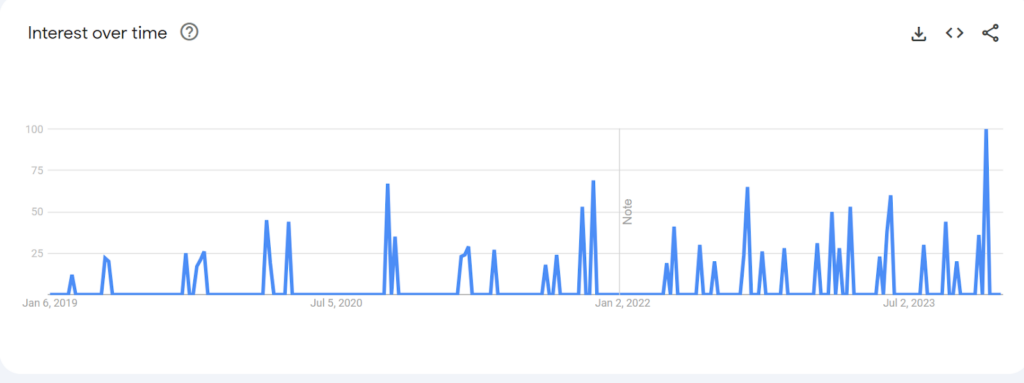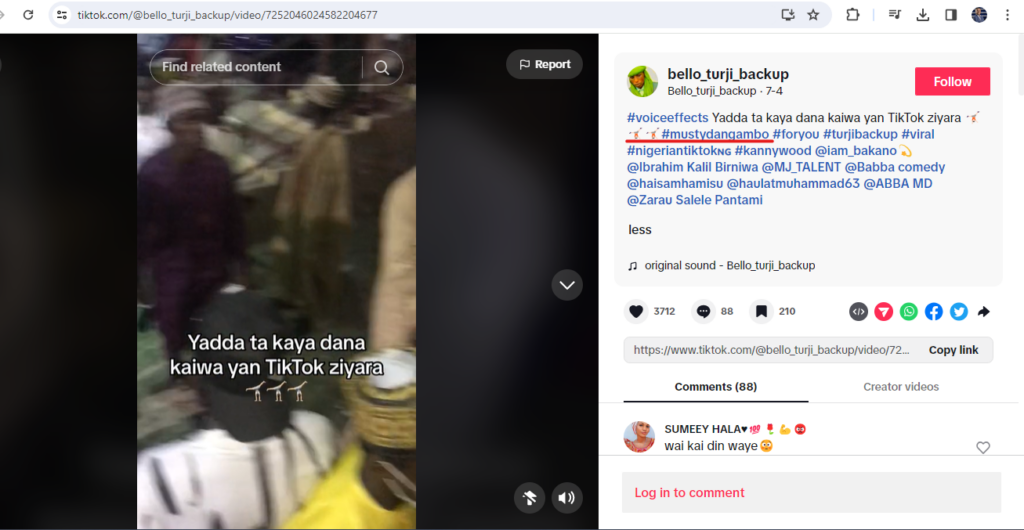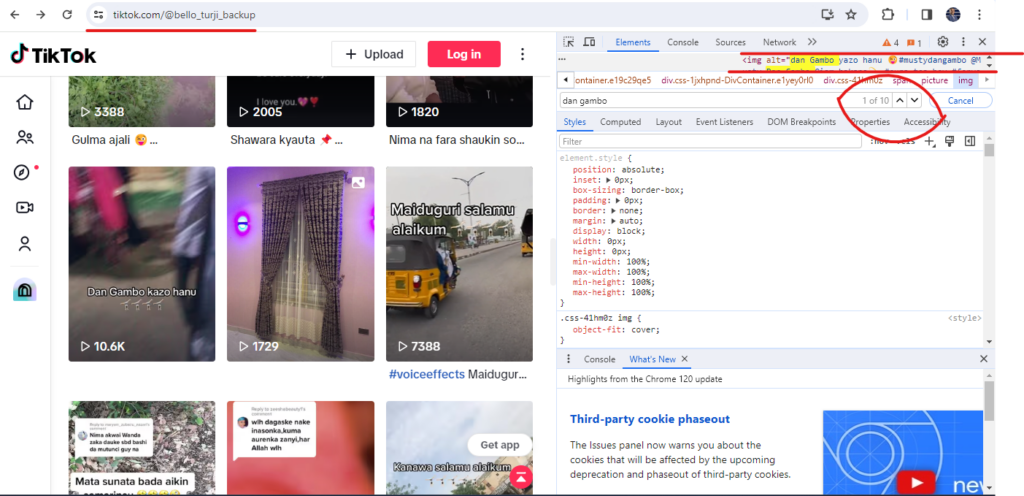The Dangerous Antics Of Impostors Promoting Nigerian Terrorist On Social Media
Bello Turji, a criminal mastermind and leader of an armed group operating in Nigeria’s North West region, found an online appeal after his acts of terror and bloodshed made national headlines. His footprints are now carried beyond his sphere of control, thanks to imposters on various social media platforms — especially Facebook, X, and TikTok.
The name rings a bell.
For many residents in North West Nigeria, Bello Turji — also known as Kachalla — connotes terror, mass murder, and kidnap-for-ransom. His portraits are prompters of sorrow and tears to his victims. Although he lives in the underworld, Turji’s terror campaigns are plastered on the walls of towns and villages in the region.
One evening in September, a Facebook user contacted HumAngle: “Someone is impersonating Bello Turji on Facebook and spreading terror on the app. What are you journalists doing about this?”
The question caused us to analyse accounts and pages on several social media websites run by impostors masquerading as the notorious terrorist.
The person who reached out had only seen a Facebook page bearing his name, but a further search showed that over 20 accounts were posing as Turji and interacting with ordinary people. Most of the Facebook accounts used the portrait of a turbaned Turji as a profile picture — or an image of him in military camouflage wielding a rifle, wearing a bandolier, and flashing his kola nut-stained teeth.
Most of the impersonators had dozens to hundreds of followers; a few others had thousands. Among the over 20 pages spotted and examined by HumAngle, one account — with the username Bello Kachalla Turji — seemed to be more active. (On Oct.12, a HumAngle reporter sent a friend request to the account user; the impostor accepted the request the following day.) With over 2000 friends, the fake account posed like Turji, spreading and glamorising terrorism on Facebook and posting at intervals to engage hundreds of his followers.
On Jan. 13, 2023, for instance, a post appeared on the Facebook page, randomly asking in the Hausa Language: “Do you people want peace?” The post amassed hundreds of impressions and comments from unsuspecting individuals who believed it was made by Turji himself.
“Of course we want peace,” one Facebook user responded. “Bastard!” another person cursed. “It is your mother that doesn’t want peace.”
On the same day, another controversial post emerged on the page: “Up till this moment, the government has not paid the ransom of the rest of the captives with us. I want you all to know that I am giving one month as a grace for the government to pay, or they will all lose their lives.”
The imposter made the post when terrorists were on a rampage in the North West. Major terrorist attacks in the region around January 2023 include the abduction of 24 Christian worshippers in a Katsina church, the invasion of Birnin Magaji, a town in Zamfara and so on. Considering these, the account seemed to have made the posts to stir up peoples’ emotions, gathering hundreds of likes and comments from his unwitting followers.
“May Allah guide you right,” one of his followers on Facebook prayed.
On many occasions, the account flaunted arms to instil fear and attract impressions. On Oct. 14 2023, for instance, he posted a 223-bore rifle laid on a mat in a place that looked like a deep forest. Expectedly, the post attracted a lot of reactions from his followers, but a Google reverse image search revealed it was not an original photo. We traced the picture to another Facebook user, Zohaib Bhai, a gun merchant based in Pakistan, who posted it on his page on Aug. 4 2023 to seek patronage. Using Google reverse image search, Tineye and other image verification tools, we observed that nearly all the guns the impostor posted on Facebook could be traced to either Zohaib Bhai or Khan Bahi Ki Dokan, another gun merchant on the internet.

The impersonated terrorist is known for a public display of terror. Wearing a dark shade and a blank face, Turji has been seen in several online clips brandishing the Russian Kalashnikov, a shoulder weapon commonly used by jihadi terrorists. By displaying weapons on a fake Facebook page created in Turji’s name, the impostor was orchestrating a known trait of the notorious terrorist to confuse his unsuspecting followers about his real identity.
However, Facebook (now Meta) forbids fake or impostor profiles and tasks people to use only authentic names and identities. In May 2019, the social micro-blog said it disabled about 2.2 billion bogus accounts and estimated that five per cent of its 2.4 billion monthly active users were fake accounts yet to be uncovered. In the fourth quarter of 2022, Facebook took action on 1.3 billion fake accounts, down from 1.5 billion in the previous quarter, according to data visualised by Statista. Some of those accounts were disguised as ordinary people, while others pretended to be celebrities or notorious terrorists.
Facebook’s policies also prohibit the promotion of violence or expressing an intent to commit violence. In 2017, the company announced steps to remove terrorism-related content on its platform — after growing pressures from governments to launch a crackdown on terrorist propaganda. In the second quarter of 2023, however, Facebook says it took action on 13.6 million pieces of terrorism content, down from 14.5 million pieces of content in the first quarter of the year, according to Statista.

Turji is not the first violent mastermind whose reputation has caused a ripple of footprints on social media. A similar trend was noticed at the height of Boko Haram, with many accounts attributed to Abubakar Shekau, a factional group leader who died in 2021. The accounts were later taken down by social media companies as part of their efforts to sanitise the platforms against content subtly promoting terrorist propaganda.
HumAngle has now discovered at least 24 Facebook profiles masquerading as Bello Turji. Many of these accounts were restricted or removed after reports reached Facebook that some persons were impersonating the terrorist. But there are still gaps. Most of the accounts — such as Beello Turjji Zamfara and Bello Tourji or even Bello Tiriji — might have been deliberately misspelt to bypass Facebook’s detective software.
From monitoring online conversations by Turji’s fake accounts to collecting data from content posted on social media accounts, HumAngle observes that many of the impostors are preying particularly on older, less educated people and those with little media literacy. It is not clear yet what the aim of the account users is, but this could range from monetising the following gathered or simply chasing clout.
Why would anyone want to impersonate a blood-thirsty terrorist on social media?
Bello Turji shot himself into national notoriety in 2021 after masterminding the burning of passengers, including pregnant women and children, in Sokoto state, an incident analysts described as “the human barbecue”. In 2022, he led his criminal gang to massacre over 200 people in Zamfara and claimed responsibility, saying the attack was to protest air and ground raids targeted at him by Nigeria’s security forces.
With hundreds of gang members, Turji first reigned in the Shinkafi area of Zamfara before moving to Sabo Birnin, a town in Sokoto East, in 2021. He took over the governance and economy of the town after displacing the village heads and appointing his men to replace them. He would write letters to communities to impose illegal taxes, amassing hundreds of millions to purchase more munitions. Turji gained more infamy for his criminal acts when he wrote an open letter to former president Muhammadu Buhari in January 2022, asking for a peace deal and spelling out conditions for a ceasefire in the northwest region.
We ran the keyword ‘Bello Turji’ on Google Trends to determine how frequently people searched for the terrorist. Tracing back to the last five years, a Google Trend search shows he maintained a low profile on the internet but gained viral appeal between December 2021 and January 2022 – coinciding with the moments his terror campaign became a subject of national discussion.

We also used Media Cloud, an open-source platform, to monitor the digital news attention or coverage on Bello Turji. The terrorist gained more news coverage in 2021, spanning 2022, with a major decline in 2023. With over 140,000 stories, Turji’s spikes in attention within the timeframe earlier mentioned signify key events that led to his notoriety on the internet, especially when he daringly wrote a letter to former President Buhari in 2021.
Around this time, the terrorist gained some sympathy from individuals who bought into his advocacy on the alleged injustice meted out against the Fulani people by the Hausas in the northwestern region. In December 2022, a praise song for Bello Turji by a local Hausa musician found an appeal on the internet, raising brows about why anyone would sing to eulogise a terrorist.
From this moment, several accounts impersonating the dreaded terrorist began to sprout on social media. The escapades of the accounts opened in Turji’s image are beyond the corridors of Facebook as the impostors are also found thriving on TikTok, X (erstwhile Twitter) and Instagram.
TikTok for terror
The first three clips pinned on the TikTok page of @bello_turji_backup raise an eyebrow. The impostor displays multiple pictures of Bello Turji with caterwauling music in the background to welcome the page viewers. We spotted more than 30 TikTok pages in Turji’s name, but this account and one other — @bello_turji — appear to be the most active.
Unlike the fake Facebook accounts, the TikTok pages are more dramatic, with several videos orchestrating the public postures of the terrorist. On the search bar, the name ‘Bello Turji’ has 3.5 million page views, and the keyword ‘Bello Turji bandit’ garnered 6.1 million, suggesting the terrorist’s notoriety on the social media app.

The user behind the @bello_turji_backup account feigns a physical semblance of the terrorist and portrays himself as his clone. He would film a part of his face to make albeit sarcastic posts that either whitewash the terrorist or romance his acts of violence. He has gathered not less than 21,000 followers. His posts have also attracted 61,000 likes. A close-mark review of dozens of videos posted by the impostor shows many of the viewers or followers believe he is the real terrorist; a few others engage with his content for clout-chasing — knowing that he’s not real.
His posts get hundreds of comments and engagements from many of his adherents. In a random post on the impostor’s page on Aug. 4, one of his followers said: “Please, Bello Turji, help me get followers. I love you.” The comment alone generated 98 comments and 990 likes on TikTok. Yet another user said: “I love you Bello Turji. When are we going to meet?”
Like a celebrity page, unwitting TikTok followers regard or interact with Turji’s impersonator, especially when he displays acts associated with the terrorist. In one such video post, a man posing like Turji appears walking in a deep forest, saying: “I am going to the place where we kept some people we squeezed recently.” Another follower also asked the fake account user with a laughing emoji in a post: “Are you the one (Turji)? If you are, I would like us to talk, I have a boyfriend I want you to kidnap?”
Reacting to the last comment, the impostor laughed out loud in one video saying: “Women are now bringing their men to us.”
We reviewed several TikTok accounts opened in the terrorist’s name and found a pattern of them regularly posting pictures and videos of Turji or showcasing his interviews with journalists and researchers in the forest. Some of the videos show an agitated Turji telling authorities to address the “serial injustice” against the Fulani people, especially by the Hausas or asking the government to negotiate with the terrorists to bring peace back to the region. Most of these videos gathered thousands of impressions and hundreds of comments, subtly promoting terrorism on social media.

Several TikTok accounts are also opened for Turji with little or no activities. Strangely, many such accounts have hundreds of followers. One of the fake pages on TikTok — @bellotirji1 — has 1,200 followers with just a video unrelated to the terrorist, but the impostor is using Turji’s image as a profile picture. Many other accounts on TikTok (such as @belloturji2, with 348 followers and without a single post) follow the same pattern: they are inactive, yet they have hundreds of followers and interactions.
We found 60 fake accounts opened for Bello Turji, using his picture as the display image on the profiles or consistently publishing content about him. After scraping and analysing 49 TikTok video posts with over 4.5 million page views, we discovered hundreds of accounts interacting with Turji’s impostors. Most of the accounts were either reacting or creating posts and tagging the terrorist’s impostors, especially after deadly attacks — and in some cases when Turji is in the news.

Meanwhile, a recent post on the TikTok page suggests a connection between a Turji imposter and Dan Gambo, a popular Hausa TikTok influencer with over 500,000 followers.
“By God’s mercy, I have successfully caught Dan Gambo,” says the impostor with the username bello_turji_backup in one video posted on July 4 2023. Then, Dan Gambo responds in the Hausa Language: “Hey, everyone, see Bello Turji… Bello Turji TikTok.”
Although this appears to be the only existing video they have in common, a source code search on the impostor’s account shows the keyword Dan Gambo has appeared on the page seven times, indicating that other posts relating to the TikTok influencer might have been deleted.
In another video post pinned on Turji’s parody account, Dan Gambo is also hashtagged, as seen in the screenshot below. The video seems to be a continuation of the one sighted above, where a group of TikTok influencers gathered at an event somewhere in the northern region.

To be sure, HumAngle contacted Dan Gambo, whose telephone digit is publicly available on TikTok and Facebook; he confirmed knowing him (Turji’s impostor) and identified him as a TikToker, a term used to describe individuals with an active presence on TikTok. When we asked that he connect us to the impostor, he declined, saying he was not inclined to do so.
Silas Jonathan, a digital investigator and fact-checker at Dubawa, a media subsidiary of the Centre for Journalism and Innovation Development (CJID) in Nigeria, corroborated our findings, saying if authorities must arrest the impostor behind the bello_turji_backup TikTok page, they can get him through TikTok influencer Dan Gambo.
“An analysis of the source code of Turji’s parody account already reveals several mentions and interactions with Dan Gambo’s TikTok handle — one of which is the video of Dan Gambo calling out the imposter behind Bello Turji’s TikTok parody account, whose face was not shown in the clip,” he states.

Three experts, including a security intelligence analyst, a peace and conflict researcher, and an information disorder specialist, agree on one thing: the thriving ventures of displaying terror by accounts opened in the name of a notorious terrorist is a subtle way of promoting terrorism.
Jesse Attah, the risk intelligence and analysis lead at Beacon Consulting, a Nigerian security intelligence and risk management firm, told HumAngle that opening parody accounts in the name of a known, dreaded terrorist — such as Bello Turji — goes a long way in promoting the activities and the actions of this terrorist and his group.
“Not everyone on social media has the amount of resilience that is needed to counter disinformation and some of the terrorists’ indoctrination tactics,” he explained.
“Some people may buy into some of their biases or certain beliefs, and at the end of the day, you have sleeper agents of terrorist groups amongst us, aiding complex attacks. Social media has a part in imparting the sentiments of certain individuals, and in the absence of curtailing some of these excesses by apologists, personas will be created for some of these terrorists who have had little or no popularity on the internet, and it’s just chaos from there on.”
However, TikTok says it takes an uncompromising stance against content with strong or subtle terrorism and violent extremism undertones. The platform also says it prohibits any content connected to a terrorist group involving activities such as recruitment, training and issuing instructions, and glorifying, justifying or gathering support for terrorism.
“We remain focused on quickly and consistently enforcing our policies to protect the TikTok community,” it said in a recent press statement. “Since Oct. 7, we’ve removed over 775,000 videos and closed over 14,000 live streams promoting violence, terrorism, hate speech, misinformation, and other violations of our Community Guidelines in the impacted region.”
Footprints on X, Instagram
Unlike Facebook and TikTok, there are only a few footprints of the notorious terrorist on X. With the username @BelloTurji1, one such fake X account posts a note that passes a strong message on his bio page.
“I will not rest until all infidels pay with their blood,” the user said in Arabic.
According to the Twitter bio, the account was opened around April 2022 — at the peak of Turji’s national notoriety. Many of the accounts we have reviewed were opened around this time. Although there are not many engagements on the page, the @BelloTurji1 impostor uses hateful language that promotes violence with tendencies to propel a breach of public sanity.

On May 13, 2022, one X user, @EmekaGift100, posted a random picture of some men swimming in mud water and wrote: “What you are seeing inside the mud water are IPOB peaceful protesters. Their only crime was calling for a referendum to determine their continued existence in Nigeria. The sad thing is that Nigerian soldiers arrested them, forced them to drink the muddy water, and many were killed.”
Responding to the post, impostor @BelloTurji1 said: “We are still not happy with our brothers that did this to the anumiri Biafra, they punish them when they should kill them, the keferis [infidels] are not to be spared their lives, they must all die. Nigeria is ours inshallah.”
Since the account was created in 2021, the user has only made six posts with minor impressions, yet it has gathered 529 followers. Also, there is a pattern in the kind of people the accounts are following on X. As against his public portrayal, the account follows only crypto and Bitcoin influencers with millions of followers.
Another account with the name Bello Kachalla Turji (@bello_turji_kac) shares the same online traits with other impersonators. Created in July 2022, according to its page, the account subtly represents Turji’s terror campaign on X. One day in August 2022, the account posted: “If anyone is travelling to Abuja, please he should let me know so that I can give a discount to his family when they come to pay a ransom.” He then tagged the Police and the Air Force in the post.
He said this at a time when the Abuja-Kaduna highway in Nigeria was a hotbed for a series of terrorist attacks and abductions. The impostor also made statements that seemed thought-provoking, such as saying, “Our gang is recruiting at the moment,” triggering lots of comments under his posts.
Two other accounts we reviewed on X have similar traits. However, X says it is against content that tends to promote or show sympathy for armed groups or terrorists and their criminal organisations. In 2016, for instance, the company said it mopped up 125,000 accounts for threatening or promoting terrorist acts.
“We condemn the use of Twitter to promote terrorism,” it said.

On Instagram, the trend is different. We found at least eight different parody accounts in Turji’s name. Unlike other social media accounts, the followership base is small. Apart from using the terrorist’s popular image as profile pictures, the imposters, in this case, did not make posts to engage their followers. But the descriptions on their bio pages appear alarming.
One Instagram page, bello_turji._, describes his state as Zamfara, his favourite place as jungle and his activity as bloodshed. On the bio page, another account user, bello_turji_1, refers to himself as a “popular Nigerian kidnapper”.
Although Turji maintains a parodying footprint on Instagram, his impostors are not patronised on the site.
We found eight accounts obviously with little to no interactions or impressions, but there appears to be coordination in the dates the accounts were opened to impersonate Bello Turji. Four of the eight accounts spotted were opened in August 2022; two were created in December 2021, with two others registered on the micro-blogging website in December 2022 and February 2017, respectively.
Keeping terror alive
It is essential to know that impersonation itself, of whatever sort, is built on lies, and lies are the bedrock of information disorder, said Silas Jonathan, the information disorder specialist at Dubawa.
He noted that the social media charade with Turji’s imagery is an old trick in the book. “You spread fear amongst the people through propaganda and fake news, and you gain control,” he explained. “This is what is playing out here and is one of the threats fake accounts impersonating terrorists such as the dreaded Turji can do — especially when they are multiple, have the attention and the following (as evident with the accounts in question).”

Any kind of impersonation on social media is by itself disinformation since it is deliberate, Jonathan continued, noting that one of the many goals of imposters who create social media accounts in the name of others, especially popular people, is to gain some sort of clout. He stressed that Turji’s impersonators obviously have sinister intentions.
“Beyond being obvious sympathisers of Turji and spreading his glory just to infuse fear amongst the northern population, their presence online also signals a targeted effort at spreading the hegemony of the terrorist on the northern populace (where he operates) and, more dangerously, using disinformation as a tool. Also, their use of the Hausa language and their deliberate effort to hide their real faces demonstrate this darker intention,” he explained.
Nigeria’s Terrorism Prevention Act outlaws promoting terrorist activities in any form, stating that anyone who directly or indirectly solicits or renders support for terrorism “commits an offence and is liable on conviction to imprisonment for a term of at least 20 years and up to a maximum of life imprisonment”. To support terrorism, it further explains, means inciting the commission of a terrorist act by sharing information through the internet or other electronic, digital, or print channels.
This article was produced with mentorship from the African Academy for Open Source Investigations (AAOSI) to tackle disinformation that undermines our democracies as part of an initiative by the International Centre for Journalists (ICFJ) and Code for Africa (CfA). Visit https://disinfo.africa/ for more information.
Support Our Journalism
There are millions of ordinary people affected by conflict in Africa whose stories are missing in the mainstream media. HumAngle is determined to tell those challenging and under-reported stories, hoping that the people impacted by these conflicts will find the safety and security they deserve.
To ensure that we continue to provide public service coverage, we have a small favour to ask you. We want you to be part of our journalistic endeavour by contributing a token to us.
Your donation will further promote a robust, free, and independent media.
Donate HereStay Closer To The Stories That Matter





